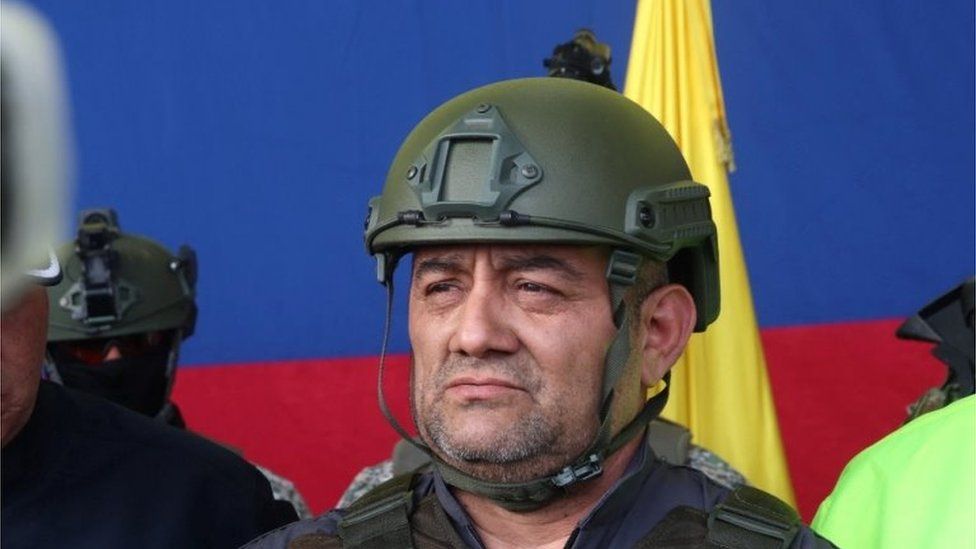News
Once Colombia’s Most-Wanted Drug Lord, The Kingpin Known As Otoniel Faces Sentencing In US

NEW YORK – For years, the man known as Otoniel was regarded as one of the world’s most deadly drug lords, the enigmatic leader of a cartel and paramilitary force that controlled much of northern Colombia.
Dairo Antonio Suga will be sentenced to at least 20 years in a U.S. prison on Tuesday. In January, he pled guilty to high-level drug trafficking charges, confessing he oversaw the shipment of tonnes of cocaine intended for the United States and admitting “there was a lot of violence with the guerillas and the criminal gangs.”
To get him extradited from Colombia, the U.S. agreed not to pursue a life sentence. Instead, federal prosecutors in Brooklyn are seeking a 45-year prison sentence for Suga, who is 51 years old and has a lot of medical issues.
In a recent court filing, his “desire for control and revenge simply cannot be overstated, nor can the degree of harm he inflicted,” prosecutors wrote. They called his decade-long rule as commander of Colombia’s renowned Gulf Clan group a “reign of terror.”
Suga’s lawyers have attempted to portray him as a product of his country’s ills — a guy born into distant rural poverty, surrounded by guerilla warfare, recruited at age 16, and forged by decades of witnessing colleagues, fellow soldiers, and loved ones slain. He sided with left- and right-wing combatants in the country’s long-running internal struggle.
For years, the man known as Otoniel was regarded as one of the world’s most deadly drug lords, the enigmatic leader of a cartel and paramilitary force that controlled much of northern Colombia.
Understanding his actions “requires a closer examination of the history of violence and trauma that shaped Colombia as a nation and Mr. suga-David as a human being,” social worker Melissa Lang wrote in a July report filed in court by his defense.
Before his arrest in 2021, Suga was Colombia’s most wanted kingpin, and he had been wanted in the United States since 2009.
The Gulf Clan, also known as Colombia’s Gaitanist Self Defence Forces, rules over a region rich in drug, weapon, and migrant smuggling routes. The group has fought rival gangs, paramilitary groups, and Colombian authorities with military-grade weapons and thousands of members. It paid for its reign by levying “taxes” on cocaine manufactured, stored, or transported through its jurisdiction. (He agreed to lose $216 million as part of his plea deal.)
“Homicides were committed in military work,” Suga admitted before the court through an interpreter.
According to prosecutors, Suga ordered the killings of perceived adversaries, one of whom was tortured, buried alive, and beheaded, and terrorized the general populace. They claim the kingpin ordered a days-long, stay-at-home-or-die “strike” after his brother was slain in a police raid, and he offered bounties for police and soldier lives.
For years, the man known as Otoniel was regarded as one of the world’s most deadly drug lords, the enigmatic leader of a cartel and paramilitary force that controlled much of northern Colombia.
“The damage that this man named Otoniel has caused to our family is unfathomable,” stated relatives of killed police officer Milton Eliecer Flores Arcila in a letter to the court. Officer John Gelber Rojas Colmenares’s widow, who was slain in 2017, stated that suga “took away the chance I had of growing old with the love of my life.”
“All I am asking for is justice for my daughter, myself, John’s family, friends, and in honour of my husband, that his death not go unpunished,” she wrote. The identities of all the relatives were redacted in court records.
Despite manhunts and reward offers totaling $5 million from the United States and Colombia, Suga Otoniel has long evaded capture by rotating between a network of rural safe homes.
According to prosecutors, Gulf Clan members attempted to poison a potential witness against him with cyanide after his detention and attempted to assassinate the witness’ lawyer.
SOURCE – (AP)






























